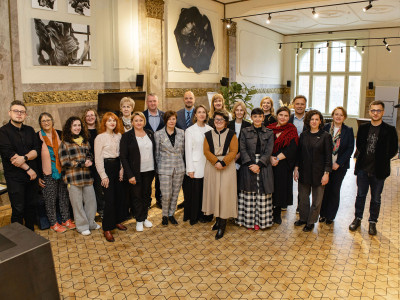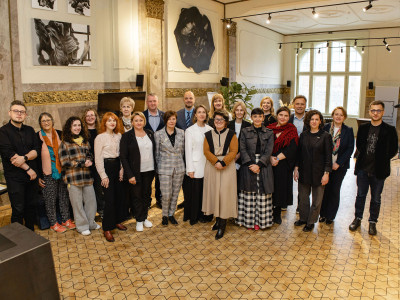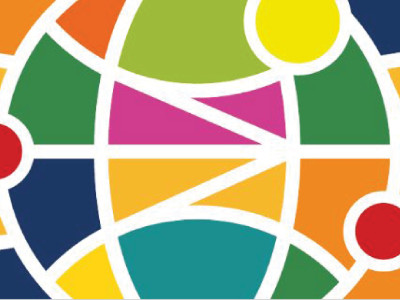On 27 September 2023, the conference “Localising the Sustainable Development Goals through Museums and Libraries II” will be held online, organised by the Latvian Museum Association, the Latvian Librarians’ Association and the Latvian National Commission for UNESCO, with the support of UNESCO Participation Programme and the British Council Latvia.
See conference programme here and discover speakers and topics:
Freedom to Be Me – Accessibility Manifesto for Lithuanian Libraries
Speaker: Klementina Gecaite, cultural activities manager at the Lithuanian Audiosensory Library
In Lithuania, transformations to make libraries accessible to all began 7 years ago. Various library initiatives have started to emerge under the state budget program to develop library services and reduce social and cultural exclusion of people with disabilities and various individual needs. All activities culminated in autumn 2021, an event called "Library for All. Conference Plus". Lithuanian librarians agreed on key areas of action and the result was a Manifesto that committed the librarians to make libraries accessible to all. Each year, a different county library takes the lead in making the Manifesto a widely known benchmark for the cultural inclusion of differently able people. In September 2023 the second Conference Plus “Stories of Inclusion” will be held to discuss the progress of the Manifesto and set new targets. This initiative contributes to Sustainable Development Goal 10 “Reduced Inequalities” raising awareness of accessibility in the broadest sense, which is an essential component of promoting the full inclusion of all people and aiming to reduce disparities in outcomes that may be caused by disabilities or print-impairments that restrict service and product selection.
Empowering Estonian Libraries on SDG and „Eesti 2035“ Strategy Goals
Speaker: Veronika Raudsepp Linnupuu, Specialist in Viljandi Town Library children and youth work / Head of Estonian Librarians' Association Fresh Approach working group
In my presentation, I will give an overview of our journey from getting to know the subject of SDG-s to pinpointing issues relevant to Estonian libraries. I will also talk about our European Sustainable Development Week campaign born from sheer excitement and carried out for the third year on zero-budget.
Ecological Literacy in Exhibitions, Educational Programs, and Events of the Lithuania Sea Museum
Speaker: Rima Aleknavičė, Coordinator of Cultural Activities of the Education Department
During the presentation, you will be introduced to the activities of the Lithuanian Sea Museum in the field of environmental protection and sustainability. Methodologies and activities will be revealed that help to increase public ecological literacy and contribute to the preservation of the Baltic Sea. The most effective educational projects, events, educational tools and programs will be presented. The audience will also be introduced to the Baltic Sea Animal Rehabilitation Center, which was opened this year; its purpose, exposition and educational activities, which are focused on the development of public ecological awareness.
Green Libraries in a Mining City – the Case of Georgia, Chiatura Municipality
Speaker: Rusudan Asatiani, President of the Georgian Library Association
Green Libraries Initiative is an international initiative that is implemented within the framework of the certification program "Leadership in Energy and Environmental Design (LEED)" and the U.S. Green Building Council. The concept is focused on environmental problems. By Georgian Library Association, a similar initiative was implemented in Georgia for the first time through the project named "Green Libraries in Chiatura Municipality", which aims to transform the rural libraries of mining city Chiatura into "Green Libraries", where it is possible to raise the awareness of the rural population and local government about the elimination of existing damage to the environment, limiting human-caused damage and impact on the environment, and changing the living conditions given naturally without disturbing the ecology.
Within the framework of the project, 15 librarians were trained as community mobilizers who can study the needs of the local population, identify priority difficulties and create small community projects based on these needs. A digital Eco-Library was created, rural libraries were transformed into modern information and training centers, which means equipping them with computer technologies and the Internet, solar power plants, energy-efficient heating were installed on library buildings, their surrounding areas were greened, small community projects were written and implemented by librarians and villagers, which are related to climate change and environmental protection.
Librarians Association from the Republic of Moldova - Community Support for Refugees from Ukraine
Speaker: Olga Matasari, Regional project coordinator
From February 24, 2022, ABRM initiated several actions in response to the crisis of refugees from Ukraine arriving in local communities in the Republic of Moldova. The problems of the refugees from Ukraine became the needs of the communities where they lived. The librarians of the country's public libraries, the members of ABRM, offered the Ukrainian refugees informational support, spaces and a wide range of services and humanitarian aid, with the support of international partners – the International Rescue Committee, Plan International Europe and UNICEF – and local organizations – Women’s Law Center from the Republic of Moldova and Amici dei Bambini branch from the Republic of Moldova.
During 12 months, within the "Power of Libraries to Make a Difference in People's Lives During Refugee Crisis" project, 10 safe spaces were opened in 10 libraries for refugee women, girls and children from the local communities. Around 450 recreational activities for women and children, 120 psychological support groups for refugee women and women from local communities and 30 information sessions for women were organized within the safe spaces. Within the project "Children for Children - Bambini per la Pace and Education Can't Wait", over 1,500 storytelling and reading club activities and approximately 170 focus groups with children and parents of children as beneficiaries of the activities were implemented during 15months.
Children from refugee communities and from socially vulnerable families from local communities participated in both projects. Through the activities carried out, we contributed to the socio-cultural integration of refugees in the communities of the Republic of Moldova, as well as providing psycho-emotional support in the library spaces.
Fostering Media Literacy in Libraries and Their Communities: Efforts by the National Library of Latvia
Speaker: Emīls Rotglvis, Media Literacy Expert at the National Library of Latvia
The presentation will focus both on the beginnings of media and information literacy as a spotlighted topic within the Latvian library space, as well as recent projects and partnerships of the National Library of Latvia, which have fostered a growing understanding of valuable information within library communities. An overview of the current situation will highlight how media literacy in libraries helps reach sustainable development goals concerning quality education, peace, justice and strong institutions.
Green Museum: Targets and Goals
Speaker: Karin Vicente, art historian based in Tallinn, Estonia; programme manager and curator at the Adamson-Eric Museum; head of the sustainable work group at the Art Museum of Estonia.
The Kumu Art Museum was the first museum in Estonia to receive a Green Museum certificate. This environmental management system (EMS) was designed specifically for the museums in Estonia tailored to target and achieve environmental goals. The presentation will introduce the steps the museum has taken in order to integrate green policies and procedures into our daily work, including in the exhibition programme, and the way we build exhibition spaces.



